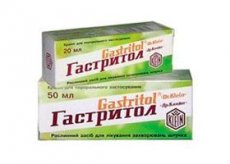Medical expert of the article
New publications
Preparations
Gastritol
Last reviewed: 03.07.2025

All iLive content is medically reviewed or fact checked to ensure as much factual accuracy as possible.
We have strict sourcing guidelines and only link to reputable media sites, academic research institutions and, whenever possible, medically peer reviewed studies. Note that the numbers in parentheses ([1], [2], etc.) are clickable links to these studies.
If you feel that any of our content is inaccurate, out-of-date, or otherwise questionable, please select it and press Ctrl + Enter.

The medicinal product Gastritol is a gastroenterological herbal preparation. Full name – Gastritol “Dr. Klein”; manufactured by Dr. Gustav Klein GmbH & Co (Germany) and Alpen Pharma AG (Switzerland).
 [ 1 ]
[ 1 ]
Indications Gastritol
Gastritol is intended to normalize the functioning of the digestive organs and symptomatic treatment of digestive disorders (functional dyspepsia), accompanied by heaviness in the stomach, heartburn, belching, flatulence, painful spasms, nausea. As an additional remedy, Gastritol can be used for such gastrointestinal diseases as inflammation of the stomach (chronic gastritis with high acidity) and gastric ulcer and duodenal ulcer.
Release form
The drug Gastritol is drops for oral administration (in bottles with a dropper with a capacity of 20, 50 or 100 ml).
 [ 2 ]
[ 2 ]
Pharmacodynamics
The normalizing motility of the gastrointestinal tract, local antispasmodic, anti-inflammatory and analgesic effect of Gastritol drops is provided by a complex of active substances that are part of the alcoholic extracts of medicinal plants included in the drug: chamomile flowers (Matricaria сhamomilla), cinquefoil grass (Potentilla anserina), wormwood (Artemisia absinthium), St. John's wort (Hypericum perforatum), milk thistle or curly wolfberry (Carduus benedictus), licorice roots (Glycyrrhizae radices) and angelica officinalis.
The aromatic compound of chamomile and wormwood, chamazulene, has anti-inflammatory properties (due to its bactericidal properties) and helps restore damaged mucous tissues of the gastrointestinal tract. Flavonoids of cinquefoil and saponin glycyrrhizin of licorice root relieve spasms in the intestines; in addition, liquiritin and licuraside contained in licorice have an anti-inflammatory effect on ulcers of the gastric mucosa.
Benedictine milk thistle – due to the content of the terpene glycoside knicin – activates the production of gastric juice and reduces the intensity of intestinal fermentation, which reduces the volume of intestinal gases. Compounds of angelica roots have several useful properties: coumarins and ferulic acid relieve spasms, borneol – inflammation, glycosides accelerate the regeneration of the mucous membranes of the stomach and intestines.
And hypericin from St. John's wort acts as a sedative on the central and autonomic nervous systems.
Pharmacokinetics
The official instructions for Gastritol note that there are no data regarding the pharmacokinetic characteristics of the drug (i.e. the entire complex of herbal ingredients).
However, it is indicated that almost all active substances are freely absorbed in the gastrointestinal tract, enter the blood, are biotransformed in the liver and excreted through the kidneys.
The content of hypericin in the blood is separately noted; it is present in the plasma for up to four days.
Dosing and administration
Gastritol drops should be taken orally half an hour before meals - 20-30 drops per dose, dissolved in one or two tablespoons of water, three times a day. Patients with increased acidity of gastric juice should take the drug in the same dosage, but after meals.
 [ 4 ]
[ 4 ]
Use Gastritol during pregnancy
Gastritol is contraindicated for use by women during pregnancy and breastfeeding.
Contraindications
Gastritol drops are contraindicated for use in cases of individual hypersensitivity to the components, internal bleeding, low hemoglobin levels in the blood, severe hypertension, epilepsy, gallstones, and composite allergies to the flowering of such composite plants as ragweed, dandelion, and wormwood.
The drug is not used to treat children under 12 years of age. Caution should be exercised when using Gastritol by patients with mental disorders, functional liver failure and a history of alcohol dependence (drops contain ethyl alcohol).
Side effects Gastritol
Taking Gastritol drops may cause side effects such as allergic skin reactions and increased photosensitivity of the skin; nausea and vomiting, pain in the epigastric region; anemia, dizziness, increased blood pressure.
 [ 3 ]
[ 3 ]
Overdose
An overdose of this drug causes bitterness in the mouth and heaviness in the liver area.
Storage conditions
Store at a temperature of +15-25ºС.
Shelf life
3 years.
Attention!
To simplify the perception of information, this instruction for use of the drug "Gastritol" translated and presented in a special form on the basis of the official instructions for medical use of the drug. Before use read the annotation that came directly to medicines.
Description provided for informational purposes and is not a guide to self-healing. The need for this drug, the purpose of the treatment regimen, methods and dose of the drug is determined solely by the attending physician. Self-medication is dangerous for your health.

